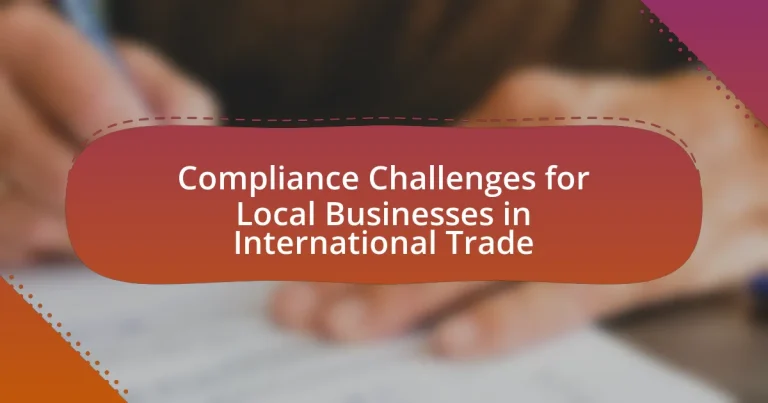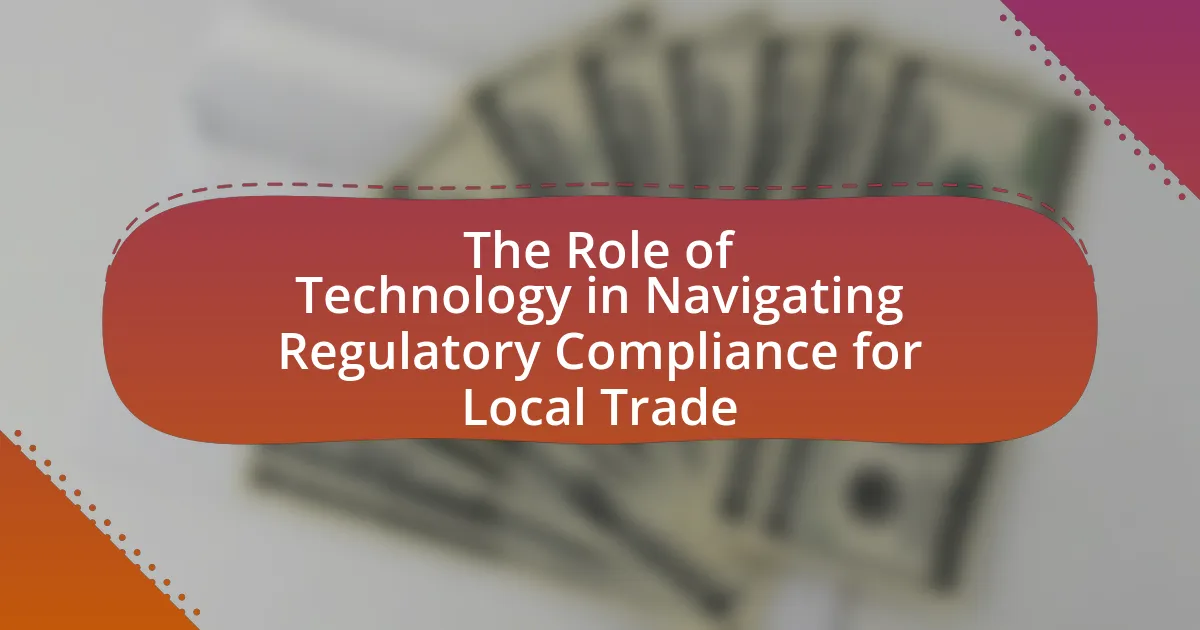Local businesses encounter significant compliance challenges in international trade due to diverse regulations across countries. These challenges include navigating customs regulations, adhering to varying tax laws, and ensuring compliance with international trade agreements, which can impose substantial costs and operational constraints. Key regulations that businesses must comply with include customs regulations, export controls, and international trade agreements such as the USMCA and the EU’s Single Market. Additionally, cultural awareness plays a crucial role in compliance, as misunderstandings can lead to violations. Effective strategies for managing compliance risks involve implementing robust compliance programs, utilizing technology, and staying informed about regulatory changes.

What are the Compliance Challenges for Local Businesses in International Trade?
Local businesses face several compliance challenges in international trade, primarily due to varying regulations across countries. These challenges include navigating complex customs regulations, adhering to different tax laws, and ensuring compliance with international trade agreements. For instance, according to the World Trade Organization, over 90% of global trade is subject to some form of regulation, which can differ significantly from one jurisdiction to another. Additionally, local businesses must manage export controls and sanctions, which can change rapidly and require constant monitoring. Failure to comply with these regulations can result in severe penalties, including fines and restrictions on future trade activities.
How do regulatory requirements impact local businesses in international trade?
Regulatory requirements significantly impact local businesses in international trade by imposing compliance costs and operational constraints. These regulations often necessitate adherence to specific standards, documentation, and procedures, which can increase the complexity of cross-border transactions. For instance, businesses may face additional expenses related to customs duties, tariffs, and the need for specialized legal or logistical expertise to navigate foreign regulations. According to a World Bank report, the cost of complying with trade regulations can account for up to 10% of the total value of exports for small and medium-sized enterprises. This financial burden can hinder competitiveness and limit market access for local businesses in the global marketplace.
What specific regulations must local businesses comply with when trading internationally?
Local businesses must comply with various specific regulations when trading internationally, including customs regulations, export controls, and international trade agreements. Customs regulations require businesses to accurately declare goods, pay duties, and adhere to import/export restrictions set by both their home country and the destination country. Export controls govern the shipment of certain goods, technologies, and services, often requiring licenses for sensitive items. Additionally, international trade agreements, such as the North American Free Trade Agreement (NAFTA) or the European Union’s trade policies, dictate tariffs and trade practices that businesses must follow to ensure compliance and avoid penalties.
How do changes in regulations affect compliance for local businesses?
Changes in regulations significantly impact compliance for local businesses by altering the legal framework within which they operate. When regulations are updated, businesses must adapt their practices to meet new requirements, which can involve changes in reporting, operational procedures, and employee training. For instance, the implementation of the General Data Protection Regulation (GDPR) in the European Union required local businesses to enhance their data protection measures, leading to increased compliance costs and operational adjustments. Failure to comply with new regulations can result in penalties, legal action, and reputational damage, underscoring the importance of staying informed and responsive to regulatory changes.
Why is understanding international trade agreements crucial for compliance?
Understanding international trade agreements is crucial for compliance because these agreements establish the legal framework governing trade between countries, including tariffs, import/export regulations, and standards. Compliance with these agreements ensures that businesses avoid legal penalties, such as fines or trade restrictions, which can arise from violations. For instance, the World Trade Organization (WTO) agreements set specific rules that member countries must follow, and non-compliance can lead to disputes and sanctions. Therefore, a thorough understanding of these agreements enables businesses to navigate complex regulations effectively, ensuring lawful operations in the global market.
What are the key international trade agreements that local businesses should be aware of?
Key international trade agreements that local businesses should be aware of include the North American Free Trade Agreement (NAFTA), now replaced by the United States-Mexico-Canada Agreement (USMCA), the European Union’s Single Market, and the Comprehensive and Progressive Agreement for Trans-Pacific Partnership (CPTPP). These agreements facilitate trade by reducing tariffs, enhancing market access, and establishing common standards among member countries. For instance, the USMCA aims to create a more balanced trade environment between the U.S., Canada, and Mexico, impacting local businesses engaged in cross-border trade. The EU’s Single Market allows for the free movement of goods, services, capital, and people among member states, significantly benefiting local businesses operating within Europe. The CPTPP, which includes countries like Japan, Canada, and Australia, promotes trade liberalization and economic integration in the Asia-Pacific region, providing local businesses with expanded market opportunities.
How do these agreements influence compliance requirements for local businesses?
International trade agreements significantly influence compliance requirements for local businesses by establishing standardized regulations that must be adhered to in order to engage in cross-border transactions. These agreements often include provisions related to tariffs, product standards, and labor laws, which local businesses must comply with to avoid penalties and ensure market access. For instance, the North American Free Trade Agreement (NAFTA) required businesses to meet specific rules of origin to qualify for reduced tariffs, compelling local companies to adjust their supply chains and production processes accordingly. This alignment with international standards not only facilitates smoother trade but also increases the complexity of compliance, as local businesses must navigate both domestic regulations and the stipulations set forth in these agreements.
What role does cultural awareness play in compliance challenges?
Cultural awareness plays a critical role in compliance challenges by influencing how businesses interpret and adhere to regulations in different cultural contexts. Understanding local customs, values, and communication styles can significantly affect compliance with international trade laws, as misinterpretations may lead to unintentional violations. For instance, a study by the International Trade Centre highlights that businesses with high cultural awareness are 30% more likely to successfully navigate complex regulatory environments, demonstrating that cultural sensitivity directly impacts compliance effectiveness.
How can cultural differences impact compliance in international trade?
Cultural differences can significantly impact compliance in international trade by influencing perceptions of regulations and ethical standards. For instance, in cultures with high power distance, businesses may prioritize hierarchical decision-making, leading to a reluctance to question authority regarding compliance issues. This can result in non-compliance with international trade regulations, as seen in countries where informal practices are more accepted than formal regulations. Additionally, varying attitudes towards transparency and corruption can affect how businesses approach compliance; in cultures where bribery is normalized, companies may engage in unethical practices that violate international trade laws. Research by Hofstede Insights highlights these cultural dimensions, demonstrating that understanding cultural contexts is crucial for ensuring compliance in global trade operations.
What strategies can local businesses employ to navigate cultural compliance challenges?
Local businesses can employ several strategies to navigate cultural compliance challenges, including conducting thorough cultural research, engaging local experts, and implementing training programs for employees. Conducting cultural research allows businesses to understand local customs, values, and regulations, which is essential for compliance. Engaging local experts, such as consultants or legal advisors, provides insights into specific cultural nuances and legal requirements that may affect operations. Additionally, implementing training programs for employees ensures that staff are aware of and sensitive to cultural differences, fostering an inclusive environment that aligns with local expectations. These strategies are supported by the fact that businesses that adapt to local cultures often experience higher levels of customer satisfaction and loyalty, as evidenced by studies showing that culturally aware companies can increase their market share by up to 30%.
How do local businesses manage compliance risks in international trade?
Local businesses manage compliance risks in international trade by implementing robust compliance programs that include regular training, risk assessments, and adherence to international regulations. These businesses often establish dedicated compliance teams to monitor changes in trade laws and ensure that all operations align with legal requirements. For instance, according to a report by the World Trade Organization, businesses that actively engage in compliance training reduce the likelihood of facing penalties by up to 30%. Additionally, local businesses utilize technology solutions, such as compliance management software, to streamline processes and maintain accurate records, further mitigating risks associated with non-compliance.
What tools and resources are available to assist local businesses with compliance?
Local businesses can utilize various tools and resources to assist with compliance, including regulatory compliance software, industry-specific guidelines, and government resources. Regulatory compliance software, such as ComplyAdvantage and LogicManager, helps businesses track regulations and manage compliance processes efficiently. Industry-specific guidelines provided by organizations like the International Trade Administration offer tailored advice on compliance with trade regulations. Additionally, government resources, including local chambers of commerce and small business development centers, provide workshops and consultations to help businesses navigate compliance challenges in international trade. These tools and resources collectively enhance a business’s ability to meet compliance requirements effectively.
How can technology aid in ensuring compliance for local businesses?
Technology can aid in ensuring compliance for local businesses by automating regulatory processes and providing real-time monitoring of compliance requirements. Automation tools, such as compliance management software, streamline the tracking of regulations, reducing the risk of human error and ensuring that businesses adhere to local and international laws. For instance, a study by Deloitte found that 60% of organizations using compliance technology reported improved compliance outcomes, highlighting the effectiveness of these tools in maintaining adherence to regulations. Additionally, data analytics can identify compliance gaps and trends, allowing businesses to proactively address potential issues before they escalate.
What are the best practices for local businesses to stay updated on compliance changes?
Local businesses can stay updated on compliance changes by regularly subscribing to industry newsletters and government updates. This practice ensures they receive timely information about regulatory changes that affect their operations. Additionally, attending workshops and seminars hosted by trade associations or regulatory bodies provides insights into compliance requirements and best practices. Engaging with legal counsel or compliance experts can further enhance understanding and implementation of necessary changes. Utilizing compliance management software can also streamline the process of tracking updates and maintaining adherence to regulations. These methods collectively help local businesses remain informed and compliant in the dynamic landscape of international trade.
What are the common pitfalls local businesses face in international trade compliance?
Local businesses commonly face pitfalls in international trade compliance, including lack of understanding of foreign regulations, inadequate documentation, and failure to stay updated on changing laws. These issues arise because many local businesses may not have the resources or expertise to navigate complex international regulations, leading to potential legal penalties and financial losses. For instance, a study by the International Trade Centre found that 70% of small and medium-sized enterprises struggle with compliance due to insufficient knowledge of export regulations. Additionally, improper documentation can result in shipment delays and increased costs, as customs authorities require precise and complete paperwork to process goods efficiently.
How can local businesses identify and mitigate these compliance pitfalls?
Local businesses can identify and mitigate compliance pitfalls by conducting regular audits and staying informed about relevant regulations. Regular audits help businesses assess their adherence to compliance standards, while continuous education on international trade laws ensures they are aware of changes that may affect their operations. For instance, the World Trade Organization provides resources and updates on trade regulations that can aid businesses in maintaining compliance. Additionally, engaging with legal experts or compliance consultants can provide tailored guidance, reducing the risk of non-compliance and potential penalties.
What lessons can be learned from businesses that have faced compliance challenges?
Businesses that have faced compliance challenges can teach the importance of proactive risk management and the need for continuous education on regulatory changes. For instance, companies like Volkswagen and Wells Fargo experienced significant repercussions due to non-compliance, highlighting the necessity for robust compliance programs and ethical corporate culture. These cases demonstrate that investing in compliance training and establishing clear communication channels can mitigate risks and enhance accountability. Furthermore, the implementation of regular audits and assessments can identify potential compliance gaps before they escalate into larger issues, as evidenced by the financial penalties faced by organizations that failed to do so.
What practical steps can local businesses take to enhance compliance in international trade?
Local businesses can enhance compliance in international trade by implementing a robust compliance management system. This system should include regular training for employees on international trade regulations, ensuring they understand customs requirements, export controls, and trade agreements. Additionally, businesses should conduct thorough due diligence on partners and suppliers to verify their compliance with relevant laws, which can mitigate risks associated with non-compliance.
Furthermore, utilizing technology such as compliance software can streamline the monitoring of regulatory changes and automate reporting processes, making it easier to stay compliant. According to a report by the World Trade Organization, businesses that actively engage in compliance training and utilize technology are 30% less likely to face penalties related to trade violations.




